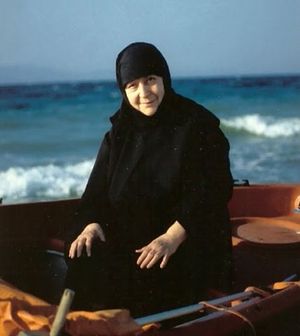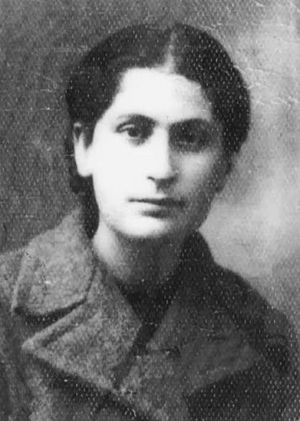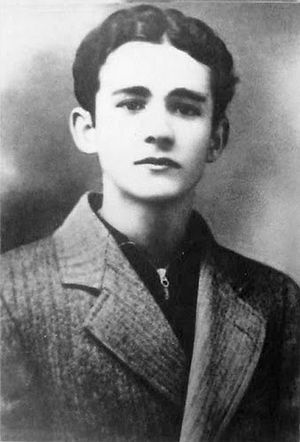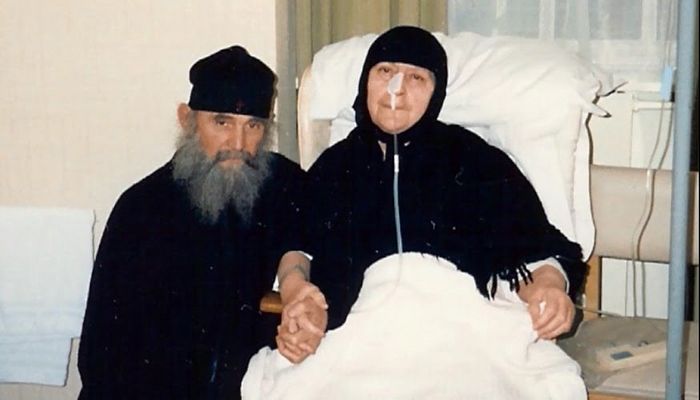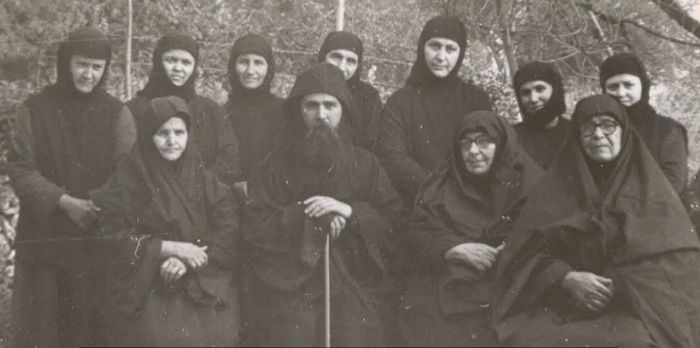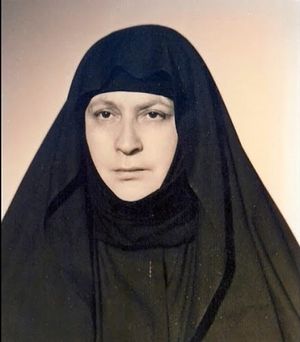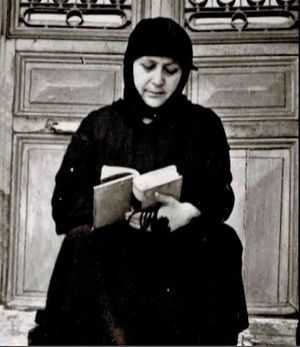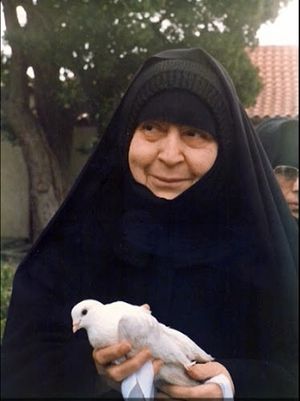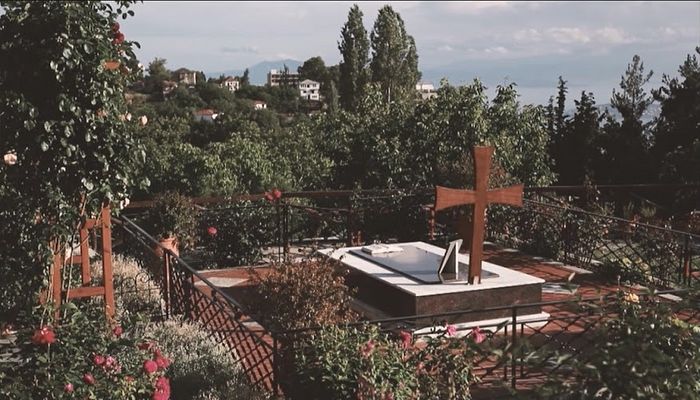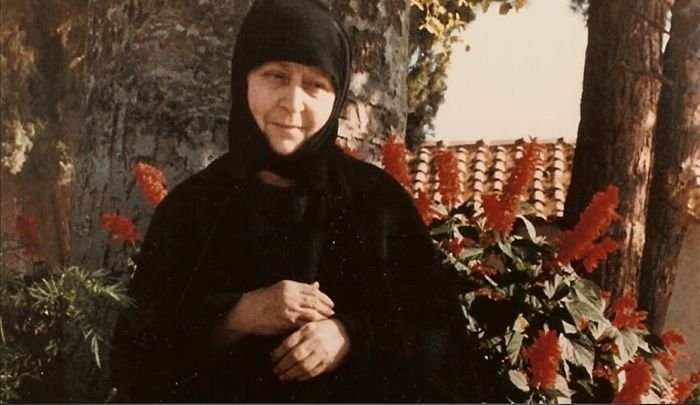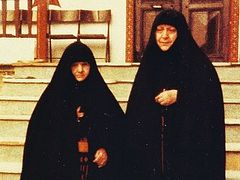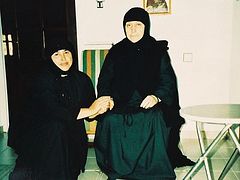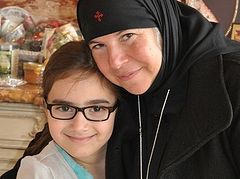Gerontissa[1] Macrina was the abbess of the Monastery of Panagia Hodigitria near the city of Volos, a spiritual child of Elder Joseph the Hesychast († 1959) and Elder Ephraim of Philotheou and Arizona. Gerontissa led monasteries founded with the blessing of Elder Joseph the Hesychast for more than thirty years, from 1963 to 1995. She acquired numerous spiritual gifts and was blessed with high spiritual states.
“She was a person of unceasing prayer”
Gerontissa lead a difficult life, full of sorrows. She was born in 1921 in a village not far from the infamous city of Smyrna in Asia Minor. Just a year after her birth the city and its surroundings suffered a terrible tragedy, becoming the final episode in the Greco-Turkish War of 1919-1922. September 9, 1922 Turkish soldiers entered into Smyrna (modern-day Izmir) and organized a terrible slaughter of the Christian population of the city. During the slaughter and ensuing fire around 200,000 people were killed. The remaining Christians left Smyrna, and the city became completely Turkish.
Gerontissa’s family miraculously survived a catastrophe in Asia Minor—the expulsion of the indigenous Greek population from these places, from their ancient homelands—and managed to relocate to Greece. The fate of around 1,500,000 Greek immigrants and refugees in war-torn Greece was very difficult. A great number of people died of starvation and sickness.
Gerontissa Markella, from the Monastery of the Most Holy Theotokos “Lifegiving Spring” (Dunlap, CA) spoke about Gerontissa Macrina’s parents: “Her parents, mother and father, were very spiritual people. Once her father told her: ‘I will die this year, on Clean Monday. And your mother will die next year.’ And so it happened. Great Lent began, and he died, and a year later her mother died.” The ten-year-old girl was obliged to work for any amount in order to feed herself and her young brother.
The Lord did not abandon the orphans. Maria stood up for herself and raised her brother. What it cost her, only the Panagia, who prays for orphans, knows.
While still a child the Lord sent Maria an acquaintance with one of the disciples of Elder Joseph the Hesychast—Hieromonk Ephraim (Karaiannis), who taught her the Jesus Prayer. She was a zealous ascetic and especially loved to pray at night.
Maria lived with her brother in Volos, a city in the center of mainland Greece, 300 kilometers to the north of Athens, near Mt. Pelion—the most beautiful in the country, glorified in Greek poetry.
Life was improving, but on October 28, 1940 the Italian army began its invasion of Greece from Albania, and Greece entered the Second World War. Maria was then nineteen years old. The brave Greek soldiers defeated the aggressor, and the Italians retreated to Albania, but in April 1941 Hitler sent his troops to capture Greece, having postponed the attack on the Soviet Union for six weeks. This was followed by the occupation of the country by German soldiers and again the horrors of war and famine. Greece experienced particularly severe destruction by the occupants in comparison with other European countries, only Russia suffering more. The starving people ate hedgehogs, mules, and turtles.
In his memoirs, the Swedish diplomat and member of the Red Cross in Greece, Paul Mon describes the Greek capital: “The city presents itself as a desperate spectacle… Children with ashen faces and thin legs like a spider’s are fighting with dogs by the garbage heaps. When the cold started in the fall of 1941 people were collapsing in the streets from exhaustion. Every winter morning this year I stumbled over corpses.”
In Volos there was no food or groceries. Maria and her brother were starving and on the verge of death from exhaustion. They were forced to separate in hopes that at least one of them would be saved. Her brother went to Thessaloniki, the second largest city of Greece, thinking he would find sustenance there, but Maria remained in Volos and lamented their separation. Again she fervently prayed. Such prayer became her main support in her difficult life.
After the war Maria worked very hard to be able to buy a piece of bread. She shared her earnings with the poor: she was distinguished for her kindness, forgiveness, great mercy, and patience in hardships.
Elder Ephraim of Philotheou was born in Volos, spent his childhood and adolescence there, and knew Maria from childhood, and recalled about her:
Once at Pascha, after long and hard work, she managed to gather money to buy herself a candle at the service of the Bright Resurrection of Christ. However, when she went to church, she ran into a poor and hungry girl. Not thinking about her own poverty in the slightest, she gave her what she had gathered with such labor. So she went to church without a candle. When the moment came to receive the holy light and all the people went up to the priest with their candles, Maria stood behind everyone, having no candle. She stood in darkness, crying and saying: “O, my Christ! What a sinner I am, not worthy of even one candle on Your feast.” At that moment, as she was saying this with tears and self-reproach, she suddenly saw the Uncreated Light. Maria lost consciousness, and the people, thinking she fainted from hunger, carried her home in their arms.
Gerontissa herself told her sisters about her spiritual experience:
At that time our spiritual father had the custom of bowing before the icon of the Resurrection of Christ immediately upon entering the church after the Paschal procession. As soon as I kissed it, I immediately felt as if the Holy Resurrection entered my heart and filled it up. I heard such a voice as if all the loudspeakers in the world had been turned on… I heard the Paschal Gospel inside myself, although Father hadn’t read it yet, and I swooned. I didn’t understand what happened to me. When I came to, the Gospel word was in my ears, remaining in my heart. Such a satiety came to me, as if I had eaten eggs, cheese, and meat from all around the world. I don’t know how long I was unconscious. These words etched themselves in my soul. I heard this beautiful voice throughout the whole Paschal service and the Gospel words brought me such satisfaction. Then I had the thought: “This would appear to be the kind of satiety the fathers felt in the desert, eating nothing”… I was exhausted throughout Holy Week from not eating and deprivation, but now a strength appeared with me. I felt like some kind of strongman. When my spiritual father said to me: “Christ is Risen!” I felt within my soul an even greater spiritual richness. When I communed, this satiety reached its limit. I headed home. I arrived. I didn’t want to eat or drink. My cousin invited me to break the fast. But how to tell her that I already “ate?” I went, but I couldn’t handle even one spoonful… So it is truly said in the Gospel that people do not live by bread alone, but by the grace of God. To the glory of Christ I tell you that I felt the grace of Christ take away my hunger, suffering, and destitution. God granted me to understand what such hardships lead to. What goodness continence and prayer bring a man!
Elder Ephraim recalls about how his mother (the future nun Theophano) met Maria Vassoloulou, and about how a small women’s community was formed in Volos: “At that time young Maria met my righteous mother. These holy souls prayed together in our kitchen, standing on their knees all evening, shedding many tears and making many prostrations to the ground. Their holy example taught me a great deal. Thanks to Maria’s virtues, several virtuous girls gathered around her from the time of the occupation, desiring to become brides of Christ.”
Fr. Ephraim (Karaiannis) told this women’s community about his elder Joseph the Hesychast, and about his instructions and spiritual guidance. When Fr. Ephraim (Karaiannis) returned to the Holy Mountain in 1952, the sisters of the community wrote a letter to Elder Joseph the Hesychast, saying they learned about him from his spiritual son, Fr. Ephraim, and asking that he would receive them also into the number of his spiritual children.
Elder Ephraim of Philotheou and Arizona recalls:
I was already on the Holy Mountain then, with Elder Joseph the Hesychast. The elder answered them: “If you will render obedience, then I will receive you. If you don’t, then I will leave you.” They replied: “Father, whatever you command us, we will obey.” Then the elder ordered them to obey Maria, who he had never even seen in his life. He explained the reason for his command: “Render obedience to Maria, for I beheld her in a vision this evening during prayer. I saw many sheep around her, and she stood in the middle. So I understood that I should make her the gerontissa. So, listen to Maria, and may no one contradict her.” They answered: “May it be blessed!” and the elder rejoiced in their obedience.
When Maria learned of Elder Joseph’s choice, she was very afraid of becoming the superior and taking responsibility for the sisters’ spiritual lives, because she was one of the youngest in the community. Then the elder prayed and by his prayers Maria had a vision: she saw a multitude of monastics ascending to Heaven, and before them went St. John the Forerunner with a sacred staff. Suddenly the saint turned to the girl and handed her the staff—the symbol of abbatial authority.
One of the nuns testified to the close spiritual connection between the sisters and Elder Joseph the Hesychast and remembered a time when Maria, already having received the monastic tonsure and having become Gerontissa Macrina, became seriously ill and began to cough blood:
We had no phone to tell him [Elder Joseph] about it—we had to write everything in letters. But we didn’t mention this in a letter, but hid it from him. We decided not to upset him and pull him away from his prayer. He sent us this reply: “My children, why didn’t you write to me that Gerontissa is sick and suffering, that we could pray about it? You acted very poorly, deciding as if it would sever me from prayer. After all, we saw her in the evening mentally, when I was praying with Fr. Arsenios, and realized that Gerontissa Macrina was seriously ill. We ardently prayed. My children, I want you to tell me about everything that happens in the monastery, and especially with Gerontissa. Write me about it.” But Gerontissa Macrina saw them both that evening next to her pillow—Elder Joseph and Fr. Arsenios, as they were praying with their prayer ropes, making the Sign of the Cross, and saying: “O Lord, heal Thy slave!” This happened many times. When Elder Joseph and Elder Arsenios prayed, they saw how things were here and how we were doing.
Before his repose in 1959, Elder Joseph the Hesychast moved the sisters under the spiritual guidance of Fr. Ephraim, now Elder Ephraim of Philotheou and Arizona. Elder Ephraim began to minister to the sisterhood. Soon the sisters acquired a plot of land in the village of Portaria near Volos and began to organize a monastery there.
Spiritual child of Elder Ephraim, Alexandra Lagos, describes it this way:
While Elder Joseph was still alive, he knew that his novice Ephraim would at some point have to take on the pastorship of this blessed community, and once gave a him a letter to read from the sisters, so that he would already have some connection with the sisters. And of course the sisters knew Elder Ephraim while still in the world. A short while later, after the dormition of Elder Joseph, Elder Ephraim left the Holy Mountain for the first time in order to visit the sisterhood, among which was his own mama. His papa had already died by this time, and his mother had joined this blessed sisterhood. Gerontissa Macrina and other sisters were also there. When they met the elder, his mother didn’t recognize him at first. So many years had passed since the nineteen-year-old unbearded youth had left his father’s house. Years of podvigs and hardships on the Holy Mountain greatly altered his appearance. Moreover, here he stood before the sisters as a hieromonk, and the custom in Greece at that time was such that women did not dare to look a monk in the face. The elder’s mother sat together with the other sisters, head bowed, not guessing that it was her son in front of her. But as soon as she realized with whom she was speaking, her face immediately changed expressions, and she very strictly said to her son: “What is this?! Why did you leave the Holy Mountain?” No such “Hello, dear son! Let me look at you! How is your health?” She calmed down only when he explained that he was fulfilling the obedience of Elder Joseph. Such an education Elder Ephraim received from his blessed mother.
The first tonsure which Elder Ephraim celebrated in the Volos sisterhood was that of his mother, in 1963. He tonsured her with the name Theophano. The second tonsure was Gerontissa Macrina (also in 1963), and Gerontissa Theophano became her sponsor. Gerontissa Macrina always considered Gerontissa Theophano her spiritual mother and obeyed her in all things. They had one cell, like mother and daughter. Elder Ephraim’s mother had no daughters, just three sons, but Gerontissa Macrina became a daughter for her instead.
In the first years, Elder Ephraim often left the Holy Mountain and stayed in Portaria for a short while, up to a month, and once longer. He instructed the sisters in the Jesus Prayer, so that they experienced spiritual states many times. In this way the nuns in Portaria received a unique spiritual education and great help from Elder Ephraim and Gerontissa Macrina, who was a holy person, and from Gerontissa Theophano, Elder Ephraim’s mother.
The abbess Macrina and her sisters were very successful spiritually. Archimandrite Sophrony (Sakharov) said of Gerontissa Macrina: “She is a titan of spirit!” Many times during his nighttime vigil, Elder Ephraim of Katounakia saw with spiritual eyes two pillars of fire in Volos, towering from earth to heaven. They signified Gerontissa Macrina and one of her glorious nuns. And Fr. Ephraim said, rejoicing: “Amazing! Just look! We labor here on the rocks so much just to find a few crumbs, but those in the world have acquired so much grace!” He also said about Gerontissa that she “was of such a spiritual degree as was Elder Joseph the Hesychast.”
Athanasios Krallist of Scholari, Greece recalls:
Once a bus of pilgrims came to the monastery, and the monastery was down to its last packet of rice. Gerontissa told the sisters to make this rice to feed the guests. The sisters exclaimed: “Gerontissa, it’s the last we have—there’s nothing left for us,” but Gerontissa insisted: “Prepare the rice for our guests, and the Most Holy Theotokos will take care of us.” The sisters obeyed and fed their visitors, and as soon as they left, a man appeared in the monastery who had brought an entire sack of rice. She had so much faith in God and love for people, for all people!
Stavros Kourousis, professor of Byzantine philology at Athens University, testifies about Gerontissa Macrina:
When people spoke with her, they saw in her face the virtues of virginity, purity, humility, obedience, unacquisitiveness, and boundless love for God and neighbor—not only for her sisters, but for everyone who came to her seeking spiritual and material support. She was a person of unceasing prayer and communion with God and the saints, by which she constantly received help in numerous temptations arising in her work of nourishing the souls entrusted to her.
Gerontissa Fevronia from the Monastery of St. John the Forerunner (Serres, Greece) remembers about Gerontissa: “Of all earthly things, she most of all loved nature and flowers, but, of course, most of all she loved spiritual things. Thus she passed from earthly beauty and Divine gifts, which she had in this temporal life, to Heavenly. Her especial interest was always all of Heaven. She was carried from this life to another in her contemplations. From earth she constantly rose up to Heaven.”
Geronitssa Markella tells the story:
One day I went to her cell when she was sleeping. I wasn’t sure if she was asleep or awake, so in any case I decided to enter quietly so as not to wake her. I began to slowly turn the handle of the door, and when the door opened I saw Gerontissa. She was sleeping, but at the same time her hand relentlessly moved across her prayer rope. She was praying while in a state of deep sleep. I never saw such a thing. Sure, they say that prayer of the heart can continue even during sleep, but to prayer with your prayer rope?!
Sisters Agnes and Parthenia from the Monastery of the Prophet and Forerunner John (Goldendale, Washington) testify:
She couldn’t manage to be strict with us. It just didn’t work. She herself was a very sensitive, very delicate person, and she felt she should relate to us the same. If she wanted to make a comment to someone, she always called them by an affectionate diminutive name. She was very gentle, very soft. Sometimes she even used the plural to soften the reproof. She wanted us to realize ourselves what precisely we had done wrong, how we had messed up. She was very, very … how to say … as in her conversations she says that it’s necessary to touch the soul of another person lightly and gently, like a feather. That is exactly how she tried to touch our souls.
George Lagos, professor of neurological medicine at the university in Ioannina, Greece, says:
In Orthodoxy, I think, the most important thing is to live Orthodoxy. Our faith and our relationship with God are living and acquired by experience. Holy people endure this experience to a greater degree. Having experienced it, they tell us about God, about the Holy Trinity, and about the dogmas of the Church. The saints are those who live in it and experience it. Gerontissa Macrina was one such holy person. We saw many miracles of Gerontissa Macrina. We received help from her—great spiritual assistance… I can vouch that I saw and felt the personal holiness of Gerontissa Macrina and great spiritual support. She was my spiritual mother, and even after her death I feel her help and prayerful intercession.
Nun Theotekna of the Monastery of St. Stephen (Meteora, Greece) recalls:
Based on my forty-five years of experience of monastic life, I can say that she was one of the most remarkable nuns in Greece. She was a great ascetic. Her advice helped many, and not just nuns, but many laity, and even many monks from the Holy Mountain turned to her for advice. She was a tall, majestic woman, and her whole appearance was imposing. Her face was illuminated. As soon as you saw her, from the first moment you understood that with her you had to speak seriously, about serious life problems. She was educated in Divine things, and knew well the lives of the saints, the Synaxarion, and the sayings of the desert fathers. Although she never had any secular education or university titles, she had the gift of spiritual discourse by the grace of the Holy Spirit. You could talk with her for hours. She could spiritually build up any visitor, especially those who strove to love Christ.
Gerontissa Macrina reposed in the week of All Saints on May 22/June 4, 1995. Throughout the few days before her death she constantly saw the Theotokos in her cell. Nuns left her monastery to restore a few Greek monasteries, and the sisters of those monasteries, in their turn, were sent to America. Elder Ephraim always wanted to populate these monasteries with sisters from Portaria, because those nuns went through a unique spiritual school and were very experienced in spiritual terms.
Instructions of Gerontissa Macrina
Idle talk is like a fire
We must avoid all idle talk, because idle talk is like a fire, the holy fathers say. As we see whole forests burnt, such that mountains are completely naked, so idle talk carries all good out of our souls, removes it from our heart, and a man becomes useless, like a rusty tin can.
He who creeps ahead, Christ will pull back
Our intentions must be put in order, that is, to convince ourselves that for the sake of being saved, we must become the last of all. He who creeps ahead, Christ will pull back, but he who places himself behind all others will be moved ahead.
You see your brother—you see the Lord Himself!
We must be attentive to our style of life, to our manners, to how we relate to those around us. How important it is! You see your brother—you see the Lord Himself! This is why the holy fathers had so much love and compassion.
On the remembrance of death
After her dormition, Gerontissa Macrina appeared to one of her spiritual daughters and said: “I would like to say to those on earth: they will be asked about all their many deeds, and they will give an account after death!”
On purity
Those young people who preserve their purity will have in the next life the grace of the ancient confessors.
On patience
The grace of patience is the strongest of all, because it is the foundation for all the other virtues.
On charity
The greatest charity is prayer for the reposed.
Prayer is the greatest gift of God
When a man has prayer, the Holy Spirit is active in his soul, that is, he abides in the Holy Spirit.
Notice how often it is said about people who have mental prayer: “Oh, what a man! His face is all aglow!” What a miraculous work is prayer.
Prayer is the greatest gift of God, and when the love of God comes to a man during prayer, he is as if bathing in this love.
If we acquire prayer, then some light will appear in our souls, and some kind of protection, because God will not abandon us and will cover us.
When a man makes progress in prayer, then he understands those states which he couldn’t even imagine before. It is as if he enters deeper and deeper into the eternal light, and sees himself from the inside. This all happens for the sake of perfect obedience and humility, when a man has extreme precision and doesn’t say to himself: “Forget it, it’s nothing to worry about. Come on, don’t pay attention to the small things.”
When the soul humbles itself, then come purity of mind, high thoughts and blessedness
When the soul humbles itself, then come devotion, love, respect, and rejection of thoughts and judgments. Seeing such great love of Christ for itself, the soul already pays no attention to the misdeeds of others. “Ah, He loves me so, and takes such care of me, adorns me from head to toe and holds me in His embrace! How could I be ungrateful?” And cleansing himself with tears, after which comes purity of mind, a man already cannot behave defiantly, or say anything unseemly. When our clothes become soiled, don’t we put them in water and wash them with soap and a brush? We should act the same way with ourselves, and then we will shine and acquire joy and ease.
How can we not come then to tears; how can we not come to blessedness and high thoughts? When you taste of this once, you will try with all your might to be extra attentive to yourself, and this attention brings prayer. For example, you will begin to refrain from idle talk and complaints, although as men we will still sometimes sin. But try to immediately take note of your fall. That is, as soon as we notice that we have disappointed Christ in some way, immediately say to Him: “Forgive me!” And when one of the sisters disappoints us? The first thing is to say: “bless” and “forgive,” with a prostration to Christ and our neighbor.
Christ waits for faith from us
Is it really hard to love Christ? Of course not. It’s quite easy to attain. Many people reach out for Him with their own hands—precisely like that: with their own hands—because they have great faith. And they tell him about their pain, about the heaviness in their souls, as if speaking with another person who they know will answer all their questions. Don’t speak coldly or doubting that you will receive what you have asked. “Do this for me, Christ. Whether I want it or not, guide me to Paradise.” Christ does not abide lukewarmness—the lukewarm he will spew out. Christ waits for faith from us.
The book “Words of the Heart” was used for Gerontissa Macrina’s biography, including her instructions and conversations, published by the Monastery of Panagia Hodigitria, and the film about her, “Echoes of the Heart,” first translated from the Greek by Olga Zatushevskaya, and also the book “My Elder Joseph the Hesychast” by Elder Ephraim of Philotheou, and recollections of Gerontissa’s spiritual children.

